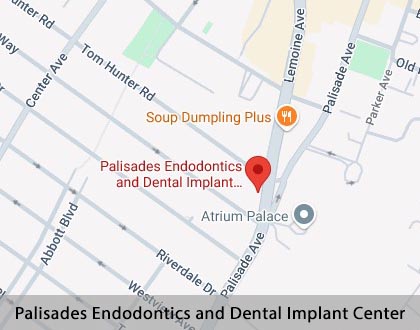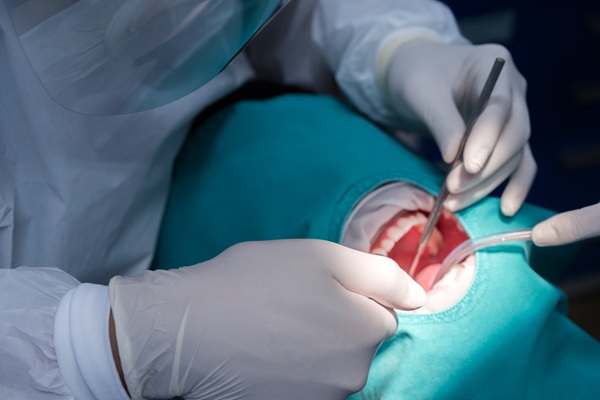Abscessed Tooth Treatment Fort Lee, NJ
A dental abscess (a collection of pus) occurs when a bacterial infection develops around the root of a tooth. A tooth abscess typically arises secondary to an untreated cavity, an injury, or old dental work. It is crucial to drain the abscessed tooth and possibly consider a root canal procedure from an endodontist.
Abscessed tooth treatment is available at Palisades Endodontics and Dental Implant Center in Fort Lee and the surrounding area. Our team offers a range of endodontic services, including root canal procedures. Call us at (201) 877-1190 to learn more.
What is an Abscessed Tooth
A tooth abscess is a pus-filled pocket that forms around the tooth's root and results from a bacterial infection. It occurs from deep decay, tooth injury (like a cracked or broken tooth), or dental trauma (like failed dental procedures) and may be associated with other hygienic risk factors.
When the soft tissue of a tooth — the dental pulp — is exposed, bacteria can invade the tooth center. Bacteria feed on damaged pulp tissue, driving the infection to spread into the root canal. A collection of white blood cells (sent to fight the infection) and bacteria form the pus.
“A tooth abscess is a pus-filled pocket that forms around the tooth’s root.”
Symptoms of an Abscessed Tooth
To diagnose an abscessed tooth, the endodontist will ask about symptoms and test the tooth's sensitivity to touch or pressure. In addition, the patient will likely undergo imaging (X-ray or CT scan) to identify the abscess and determine the extent of infection.
Common signs of a tooth abscess:
- Difficulty breathing or swallowing
- Fever
- Pain radiating to the jaw, neck, or ear
- Pain when chewing or biting down
- Sensitivity to hot and cold temperatures
- Severe, throbbing toothache that persists
- Swelling of the cheek or face
- Sudden rush of foul-smelling, foul-tasting, salty fluid in the mouth
“…the patient will likely undergo imaging (X-ray or CT scan) to identify the abscess and determine the extent of infection.”
Importance of Seeking Immediate Endodontic Treatment
If left untreated, a dental abscess can be painful as well as dangerous. The bacterial infection can easily spread to nearby tissues, like the gums, jawbone, or sinus cavities. Eventually, it can spread to other areas of the body, including the bloodstream. A tooth abscess will not go away without treatment, and an endodontist has the skills necessary to help manage any signs or symptoms of an abscessed tooth.
If a patient presents with fever or swelling or has trouble breathing or swallowing, the patient should seek emergency care immediately. These symptoms indicate the infection has begun to spread deeper into the jaw and surrounding tissue.
“If left untreated, a dental abscess can be painful as well as dangerous.”
Check out what others are saying about our dental services on Yelp: Abscessed Tooth Treatment in Fort Lee, NJ
Endodontic Treatment of an Abscessed Tooth
Endodontists are trained specifically to care for abscessed teeth, including critical pain management techniques. Endodontic treatments require keeping patients comfortable during complex or painful procedures. Also, unlike a dentist who may perform a few root canals per week, the typical endodontist performs an average of 25 root canals a week.
After applying the numbing medication, the endodontist will drain the abscess and perform a root canal treatment in which the infected tissue and root get removed. The canal will be cleared out to receive a dental filler, and the tooth will receive a protective crown during a subsequent visit.
“Endodontists are trained specifically to care for abscessed teeth, including critical pain management techniques.”
Questions Answered on This Page
Q. What is an abscessed tooth?
Q. What are the symptoms of an abscessed tooth?
Q. What happens when an abscessed tooth goes untreated?
Q. How is a tooth abscess treated?
Q. What are the aftercare instructions for abscessed tooth treatment?
People Also Ask
Q. What are the three types of tooth infections?
Q. Why do endodontists perform root canals?
Q. What are the symptoms of a tooth infection?
Q. What is the difference between a dentist and an endodontist?
Q. Why should I see an endodontist for a root canal?
Q. What should patients do after receiving endodontic treatment?
Aftercare
It usually takes a couple of weeks for the mouth to heal following a tooth abscess treatment. For a smooth recovery, patients should follow precise aftercare instructions:
- Apply a warm compress to the treated area 3 times a day
- Keep teeth clean by brushing twice daily with a soft toothbrush
- Over-the-counter or prescription pain medications may be taken as instructed
- Rinse the mouth with lukewarm salt water every 2 hours
- Stick to soft foods like eggs, applesauce, yogurt, pasta, cooked vegetables, and more
- Soak a cotton ball in warm water and place it next to the tooth or gum for 10 minutes or until the compress cools off
Any unusual symptoms during recovery — such as persistent pain, swelling, or bloody and pus-filled discharge — could spell trouble. Patients should notify the endodontist right away if they notice these symptoms.
“For a smooth recovery, patients should follow precise aftercare instructions.”
Frequently Asked Questions
Q. What is a tooth abscess?
A. A tooth abscess is a pocket filled with pus that collects around the tip of the tooth's root. It is caused by a bacterial infection. White blood cells that fight off infection mix with bacteria forming pus.
Q. What are the complications associated with an abscessed tooth?
A. The infection associated with a dental abscess can spread to surrounding tissue, including the gums and jawbone. Eventually, it travels to the bloodstream and the rest of the body. For this reason, an abscessed tooth is considered a dental emergency.
Q. How do endodontists treat an abscessed tooth?
A. An endodontist is specially trained to treat the soft tissue of the tooth. The practitioner will drain the abscess and then perform a root canal treatment to remove all of the infected dental tissue. The final step involves a tooth restoration, usually a crown.
Q. What should I do after I have gotten treated for an abscessed tooth?
A. You will likely take antibiotics to treat any remaining infection and over-the-counter pain relievers to aid in your recovery. Additionally, keep your mouth clean while you heal:
- Rinse your mouth with salt water every 2 hours
- Brush your teeth twice daily with a soft toothbrush
- Apply a warm compress to your tooth or gums three times a day
- Eat soft foods like eggs, applesauce, yogurt, pasta, etc.
Q. How many appointments does it take to treat an abscessed tooth?
A. The number of appointments depends on how extensive your treatment needs to be. An endodontist can perform the root canal in one visit. The restoration may be done at a separate appointment. Our team will discuss the specifics after examining your case.
Start Feeling Better – Visit Us Today
By visiting us as soon as possible, our team can help get you the professional treatment you need. Instead of waiting around and allowing the symptoms to get worse, we can provide you with treatment options.
Definitions
Learn More About Abscessed Tooth Treatments
Although an abscessed tooth usually forms secondary to another dental problem (an untreated cavity, tooth injury, or old dental work), it is considered an emergency. To reduce the risk of infection spreading to other parts of the body or passing into the bloodstream, you should seek endodontic treatment for a dental abscess or tooth infection as early as possible.
If you are in search of an endodontist in Fort Lee, let Palisades Endodontics and Dental Implant Center help. Call us at 201-877-1190 to learn more about our services and policies.
Helpful Related Links
- American Association of Endodontists (AAE). Home Page. 2024
- American Dental Association (ADA). Home Page . 2024
- Cleveland Clinic. Abscessed Tooth. 2024
- Healthline. Abscessed Tooth: What You Need to Know. 2024
- MedlinePlus. Root canal. 2024
- Mayo Clinic. Tooth abscess. 2024
- Mouthhealthy. Abscess. 2024
- WebMD. Dental Health and Root Canals. 2024
About our business and website security
- Palisades Endodontics and Dental Implant Center was established in 1997.
- We accept the following payment methods: American Express, Cash, Check, Discover, MasterCard, and Visa
- We serve patients from the following counties: Bergen County
- We serve patients from the following cities: Fort Lee, Palisades Park, Leonia, Edgewater, Ridgefield, Englewood, Tenafly, and Alpine
- National Provider Identifier Database (1124100102). View NPI Registry Information
- Norton Safe Web. View Details
- Trend Micro Site Safety Center. View Details
Back to top of Abscessed Tooth Treatment










